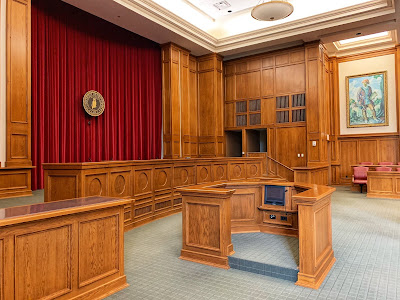How We Judge A Man
How do we judge a man?
It’s a tricky question. After all, how often have we been told
not to judge anyone at all? Realistically, we do and must judge others every
day. We judge their character to determine whether or not they are a “good”
person. The criteria for this judgment has always been difficult for me to
determine.
However, after a disturbing experience in one of my college
courses, I discovered the answer to that question.
In my public speaking class, we were given two minutes to prepare
an impromptu speech in response to a random prompt. One young man announced
that, according to his little slip of paper, he was called to defend his friend
who had been arrested for possession. He took the floor, threw away the paper,
and began with a decent—albeit generic—introduction.
“Ladies and gentlemen of the jury, do we judge a man for his
mistakes, or for the strength of his character?”
It felt like a line from a corny movie, but I could hardly hold
that against him when he only had two minutes to prepare. Then, the speech went
horribly awry.
He began to list examples of famous individuals who had made
famous mistakes, and yet they still held public affection. His words sent a
cold wave of nausea to my core. Though I knew it was inappropriate and unprofessional,
I visibly grimaced and shook my head, appalled at what I was hearing.
He asked, “Do we judge Kobe Bryant for his rape accusation,
or for the millions of fans he inspired?”
/cdn.vox-cdn.com/uploads/chorus_asset/file/19653037/102186206.jpg.jpg) Do I judge Kobe Bryant for his rape accusation? Do I
judge this man for forcing a woman to have sex with him against her will in 2003? Do I
judge him for essentially pleading guilty to this disgusting, violent act and apologizing
by paying off his victim and claiming he thought it was consensual, despite the physical evidence against him?
Do I judge Kobe Bryant for his rape accusation? Do I
judge this man for forcing a woman to have sex with him against her will in 2003? Do I
judge him for essentially pleading guilty to this disgusting, violent act and apologizing
by paying off his victim and claiming he thought it was consensual, despite the physical evidence against him?
Yes, I do.
Too often are famous men forgiven for their unforgivable “mistakes.”
Somehow, their fanbase elevates them above the call of justice. In
recent years, many actors and directors have fallen from grace as accusations
of sexual assault have come to light. And yet, I am reminded of the many cases that
never see the light of day. I am reminded of cases that escaped justice, like O.J. Simpson.
Should we judge a man for his mistakes? No, that would
hardly be fair. After all, I would hate to be judged for my own mistakes.
However, I propose that we must judge a man for how he atones for his
mistakes.
Being a public figure means that there are millions of
people looking up to you, always watching, listening, whispering. It means that
the choices you make set an example to the masses.
Remember Robert Downey Jr.’s experience? He was addicted to drugs and was arrested for breaking into a family’s home and falling asleep in the young daughter’s bedroom. His narrative reads very differently from Kobe Bryant’s. Downey went to prison. Today, the man is more successful than ever. He served his time, and he adamantly owns up to his past mistakes. He knew that he had to pay for the crime he committed. He used this terrible experience as a turning point in his life. He was brave enough to do what Bryant did not. I believe that his actions were a lesson to his viewers that we should be brave enough to do the same with our own mistakes.
When Bryant chose to avoid taking responsibility for his
actions, he told young men all over the world that rape was no big deal. He
told them that he did not need to be punished for sexual assault. He told them
that his talent, his wealth, and his fame were more important than his morality.
The tragic death of Kobe Bryant broke my heart, regardless
of my perception of his character. His daughter was young and innocent. The young
family traveling with him left behind many loved ones. Bryant himself had family, friends, fans, and young athletes all over the world who would mourn
his loss.
Worse still, he will never have the chance to make things right. The justice system failed that young woman, falsely absolved
Bryant, and disappointed me. Still, if we believe that “justice is mine, thus
saith the Lord,” there is hope yet. It is out of our hands, but that does
not mean that it is over.
In the meantime, what do we do? How can we mourn a legend
who committed such an atrocity? How can we comfort his fans? What good does
getting angry do, now that he’s gone?
The answer is simple. We readjust how we judge our fellow
men. We hold them accountable for their mistakes, and then judge them for how
they learn and grow from those mistakes. We watch for the ones who don’t merely
apologize but take action to repair the damage. We condemn the ones
who do not.
 Above all, we cling to our hope for humanity. We act out of love,
not vengeance. We uphold justice, not out of revenge but out of respect for the
victims. Perhaps this vision is naïve. Perhaps it is an unattainable fool’s hope.
Above all, we cling to our hope for humanity. We act out of love,
not vengeance. We uphold justice, not out of revenge but out of respect for the
victims. Perhaps this vision is naïve. Perhaps it is an unattainable fool’s hope.
Then again, change usually begins with a fool’s hope.
For more information on the 2003 rape case against Kobe Bryant, here are some links to several articles on the subject.





Looking to host a special event or celebrate a milestone occasion? Our restaurant best japanese food new york offers private dining options and event packages tailored to meet your specific needs. Whether you're planning a birthday party, corporate gathering, or wedding rehearsal dinner, we'll work with you to create an unforgettable dining experience for you and your guests.
ReplyDelete